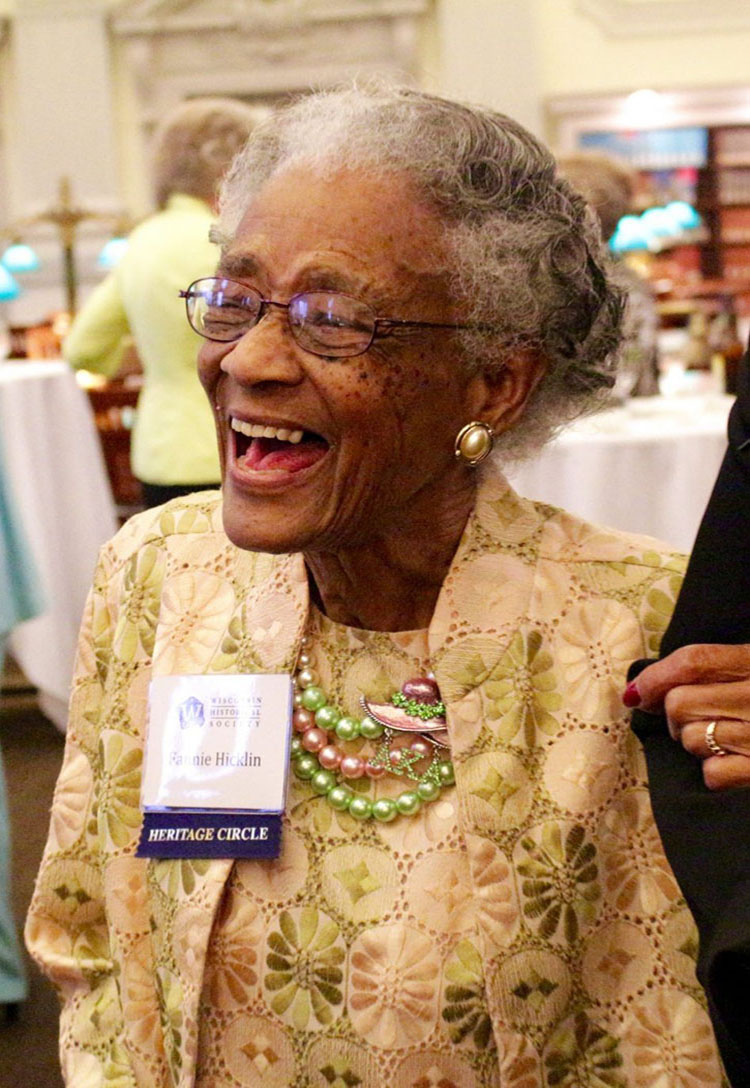UW-Whitewater’s First Black Professor Was Also State Historical Society’s First Black President – And Just Turned 100
Tables prepared for an evening of fine dining littered the marble floor of the Wisconsin Historical Society library on a recent Friday evening. The students that typically pack the second floor were replaced by a variety of dapperly dressed, mostly white, middle-aged people. The hundred or so
people all gathered together to recognize and celebrate a single person, Dr. Fannie Hicklin, who turned 100 years old last month.
Dr. Fannie Hicklin has championed civil rights and bettering the conditions of all spaces throughout her life. She has been a forerunner in Wisconsin, becoming UW-Whitewater’s first African American professor the same year the Civil Rights Act was passed, in 1964. She was a professor
of theater until 1988. Hicklin’s mark on the state’s history is reflected on UW-Whitewater’s campus theatre, which was named Hicklin Studio Theatre in 1996. Hicklin Studio Theatre During her time at the University of Whitewater, she proudly says, “Not once did I feel any type of
discrimination by faculty, staff or student’s parents. I never thought about being the first black professor there because I was treated like anybody else.”
Over the course of her time at UW-Whitewater, Hicklin directed more than 50 productions and also served as the school’s first Associate Dean of Faculties, Director of Affirmative Action and Chair of the Theatre/Dance Department. Dr. Hicklin discussed how UW-Whitewater’s hiring committee “cared a lot about the teachers, and really looked at people for their qualifications. They weren’t concerned with your race.”
A profound trait of Dr. Hicklen, is her focus on joy, and the importance of not allowing any environment, no matter how negative, to consume you.
“The emphasis, when we were growing up, was to recognize who we were and that if you knew you were capable of something, nobody can make you think less. We have ability, you have ability, and pay no attention to them. I had very good teachers,” she said. “I grew up in a tiny segregated
town called Talladega, but I went to an integrated school with white and black teachers, who taught us that we were capable, very capable, and not to let anyone say we weren’t.”
By 1977 she joined the board of the Wisconsin Historical Society. From 1991 to 1995, she served as the Wisconsin Historical Society’s Board of Curators first African American president. It was evident that the relationship Dr. Hicklen has with the Society is a strong, family-like bond. “I have great admiration for the Society,” she says.
The event’s atmosphere circled around the warmth and grace of Dr. Hicklen’s presence. Her high-spirited aura echoed throughout the space filling everyone in attendance with a wholesome energy. Waves of attendees made their way to greet Hicklin as she sat in lounging space with her daughter nearby. She donned a dress suit in the pink and green emblematic of her sorority, AlphaKappa Alpha, with pearls and a pin to match. When asked what the driving force that inspired her lifelong commitment to making conditions better was, Hicklin replies, “My father.” Hicklen’s father was the only person in his family to graduate from high school. “He had a farm for things that were difficult to get so they had their own dairy and their own laundry and raised a lot of things.”
Dr. Hicklin discussed how conditions have changed, though there are still a lot of bigots. “We can get jobs in areas that before nobody was able to get before, now in almost any industry you can find blacks,” she says. Still, she also reacalls how when she first got to Madison she had incredible difficulty finding housing. “There was definitely racism. It was very very difficult. As soon as they would find out you were black, there was always some excuse” as to why they couldn’t rent to her, Hicklin said.
She then shared a story from her time as a student in Michigan pursuing her masters but having a professor who was “An egotist that had a bias against me. Whenever I got an A, the following grade he would give me a B regardless of my work.” With a laugh, Dr. Hicklin recounts the results: “Other students started to notice as well, since I was the only black person. Then news got around and he was not used anymore.”
There were few moments during the birthday celebration when Dr. Hicklin was not smiling or telling a captivated greeter a joke. She added a flare to any conversation. It was with this lesson in mind that brought Dr. Hicklin success throughout her career and the praise of her peers. The current Director of the Wisconsin Historical Society, Christian Overland,
called the event “A celebration of a centennial, and not just her legacy but her impact on the future.” He noted Hicklin’s leadership model from when she served as president of the board in 1991 as a one that is still in place.
He then went to share how he first met Dr. Hicklin, not knowing she was their president. “She was serving me punch and then she told me who she was, and I was in awe,” he says. Overland stresses the importance and impact of recognizing Dr. Hicklin’s milestone, explaining, “It’s a way to celebrate her legacy and the next 100 years.”
In a closing statement Overland noted how the goal of the Society was to use history like Dr. Hicklin’s to keep “transforming lives using history.”
Written by Edgar Sanchez
At the time of this article’s original publishing, Edgar Sanchez was a reporting intern with Madison365, a sociology major at UW-Madison and a working DJ.

